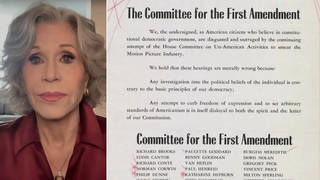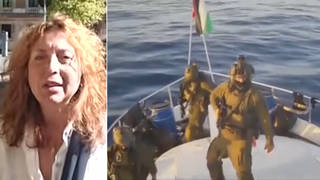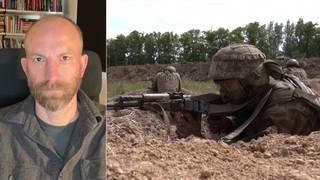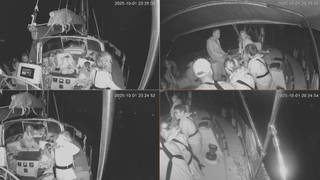
Guests
- Nataliya GumenyukUkrainian journalist based in Kyiv and founder of the Public Interest Journalism Lab.
Russia has announced it will formally annex four areas of occupied Ukraine on Friday, after organizing referendums in the regions widely denounced by Ukraine and its allies as a sham. We speak with Ukrainian journalist Nataliya Gumenyuk, who explains how armed Russian soldiers went to the houses of Ukrainians in the occupied territories, forcing them to vote. She also describes widespread abuses committed by Russian forces, including mass graves and suspected torture chambers. Meanwhile, more than 200,000 Russians have fled the country over the past week following Russian President Vladimir Putin’s announcement of a partial military mobilization to draft at least 300,000 people. Gumenyuk says she hopes the draft will “create some disturbance within Russia” now that the war is impacting middle-class Russians.
Transcript
AMY GOODMAN: This is Democracy Now!, democracynow.org, The War and Peace Report. I’m Amy Goodman, with Nermeen Shaikh.
We end today’s show looking at the war in Ukraine. Russia has announced it will formally annex four areas of occupied Ukraine on Friday. This comes after voting ended Tuesday in a hastily organized series of referenda that were widely denounced by Ukraine and its allies as a sham.
Ukrainians living in the occupied areas could soon be drafted into the Russian military. Last week, Russian President Vladimir Putin announced a partial military mobilization to draft at least 300,000 people. This has prompted widespread protest in Russia and a mass exodus of draft-age men. At least 200,000 Russians have fled the country over the past week.
This all comes after Ukraine launched a successful counteroffensive in the Kharkiv region, recapturing 3,400 square miles of land seized by Russia. That’s more land than Russia had captured in the past five months. Investigators are now uncovering evidence of potential war crimes, including mass graves and suspected torture chambers in areas that had been under Russian occupation.
We go now to Nataliya Gumenyuk. She is a Ukrainian journalist based in Kyiv, the capital of Ukraine. Her latest piece in The Guardian is headlined “Putin is mobilising 300,000 more soldiers to fight his war. But Ukrainians feel hope, not fear.” Her other recent piece, which appeared in The Washington Post, is headlined “Ukrainians are rejoicing at victory — and awash in trauma and grief.” Nataliya is the founder of the Public Interest Journalism Lab. Her work focuses on human rights, conflict reporting, and documenting war crimes with The Reckoning Project.
Nataliya Gumenyuk, thank you so much for being with us, joining us today from Vienna, Austria. Can you talk about your trip to Izium, what you found there, and Kharkiv? What’s being discovered?
NATALIYA GUMENYUK: So, of course, apart from the joy of the liberation of the territory, where around one hundred — or, 50,000 people live, we also find these horrendous things, like the mass graves. And we’re speaking about 300 different towns, villages, hamlets. But, like, being in a couple of them, we can see that in any major, let’s say, small town, there would be a torture chamber where people would be kept without any reason, largely male but also female. And especially being very careful of documenting, we see that they would be tortured with electric shock, beaten and held in these severe conditions. And at least in Kharkiv region, the local authorities, the Ukrainian authorities, speak about around 18, these type of the torture chambers. We may verify that, as a journalist, coming from town to town and seeing with their own eyes and talking to the people who were liberated.
And this is, unfortunately, not very much the news for us. We’ve been following the situation earlier. And what is important to understand, when we’re discussing this so-called annexation or the other territories which is under the Russian occupation now, we hear the similar reports for the last months. So, for Ukrainians, it’s still the critical point to liberate other towns, because it’s a very practical story for the people to regain — not just to regain the territory but free the people from these persecutions which are taking place.
NERMEEN SHAIKH: Nataliya, could you elaborate — before we go to the other areas that need to be liberated, could you elaborate on the number of people you spoke to and the kinds of stories you heard in the areas where you recently were, Kharkiv, etc.?
NATALIYA GUMENYUK: So, look, for my team, we’ve spoken about hundreds of people within the last half of year, which tells us more or less the consistent story. If you’re speaking about like the recent trip, we would speak about the dozens — out of these, there would be, you know, around dozens who — dozens and dozens who experienced the tortures themselves and had been kept in the basements. And the irony and to tell that it’s more systematic — we can see very similar patterns, the way how in different towns people would be tortured by particularly the Russian soldiers, and with all kind of the mockery and reference to, you know, glory with Russia and how they would, like, satisfy Vladimir Putin, which was a bit shocking even for me at this stage.
Largely men, but what I should say, that the person who could be at — men, let’s say, would constitute a danger, and somebody, without — you can be, you know, a Ukrainian Armenian, a Ukrainian Russian speaker. You can be a local teacher. You can be just physically fit. Or you can have a weird tattoo. That would be enough to get into this situation, unfortunately.
NERMEEN SHAIKH: And were there incidents that other human rights organizations have documented of sexual violence against women?
NATALIYA GUMENYUK: There were the cases, and I think the U.N. also issued recently the report where things were recorded. We know these cases are out there. We can ourselves not verify, but hear the records from the trusted — let’s say, trusted sources. The problem with that, that according to the Ukrainian legislation, the woman or the person who has been raped should report herself or himself; otherwise, this case is not considered, which, of course, because of the trauma, makes these investigations more difficult and, of course, traumatic.
AMY GOODMAN: You have just come from Izium. In our headlines today, we reported Ukrainian officials have finished excavating a mass burial site in a forest there, which Ukraine recaptured in the counteroffensive. Kharkiv’s regional governor said most of the 436 people buried in the site had their hands bound, with gunshot wounds and signs of torture. Can you talk about this area, Izium, its significance, for people outside of Ukraine, and then if you also have found this kind of, well, what many would call war crimes?
NATALIYA GUMENYUK: So, we found a lot. And I won’t say that, unfortunately, there is a significance of this town. These are the first number of the towns which are newly liberated. So, contrary to — compared to, for instance, Bucha and the stories and regaining the territories after the first months of the war, we can speak about the towns where the Russian state for half a year, and that makes the situation worse and the number of the casualties bigger.
But we talk all the time to the people who are trying to escape from those territories, which is difficult since May. And we know, knowing the villages, that in that village there is a house where, for instance, 10 people are missing, and that amount of people were brought. So, the smaller the town, the smaller this mass grave is. But we can speak about a omnipresent practice. So, it’s not the aberration. That’s the problem. The exhumed is not an aberration. It’s the system, which, of course — so, I think the very important message would be that it’s not just about uncovering. It’s about stopping something which was happening, which might happen now, because, for instance, I talked to men who were liberated and who left those prisons and, luckily, were not executed, especially because the town had been retaken.
NERMEEN SHAIKH: And, Nataliya, what are the other towns now where your work is focused, meaning what towns do you expect to be retaken now? And are you able to hear anything from people there, where Russian forces are still in control?
NATALIYA GUMENYUK: So, yeah, absolutely. That’s something we’re doing on the daily basis for half a year. We’re speaking about Kherson region, Mykolaiv region and exactly those territories which Russia is trying to, you know, announce the annexation of it. Of course, there was the success of the Ukrainian counteroffense, depending a lot on the surprise. It’s not exactly — it won’t be surprise any longer. But we’re speaking about the possibility of liberating Kherson and maybe some other smaller towns.
Of course, there is this — which I won’t probably correct. There is the media using the term, you know, “sham referendum” or something. What we know by talking to the people, it’s a bit of different situation. It’s not really you rig the elections, or you pretend or you write down the ballot and try to show that more people voted than actually voted. Talking to the people, because there is a phone connection, there is sometimes the internet connections, and there is enough of visual evidence that there would be military with the guns coming to the houses of the people and forcing them to the vote. So, it’s really very disturbing, you know, like, even to use their — should it be called a referenda if somebody comes your house with a gun? And it’s largely done, you know, to create this media operation that the world, the international press or the Russian official channels speaking about some kind of imitation of the poll.
AMY GOODMAN: Nataliya, you founded the Public Interest Journalism Lab. You’ve certainly been critical of your own government, of Ukraine, as a journalist, around issues of corruption and other issues. What about now during the war? Have you also found atrocities committed by Ukrainian soldiers? And what are your thoughts, as well, on the fact that so many Russian men are fleeing Russia right now so as to not serve in Ukraine? Two different questions.
NATALIYA GUMENYUK: So, I think it’s very important to understand that we really used to think about the places where war happens as the authoritarian places, where there is the, you know, like, lack of freedom of speech, extreme centralization and things like that. Interesting enough, Ukraine is — yeah, it’s a democratic state with democratically elected government, with existing [inaudible] opposition, with existing pluralistic press. And therefore, we feel as — you know, there is some responsibilities, because of the security concern. But wherever I write the very same things which I write to the Ukrainian media to the international media.
No, we didn’t have — and we talked to numerous international organizations, that there is a different tactic. Ukrainians are waging the justified war. All my friends who are human rights defenders, many of them are fighting themselves. They are also captured as prisoners of war. And these are the people who are human rights defenders themselves. And, like, talking even to them, who are embedded in the army, you know, just checking myself, they would say that the war is waged in a very different way. We have some information, you know, on the early stage about whether the Ukrainians’ army, you know, how they treated the Russian prisoners of war. But those cases, as far as I know, had been investigated.
What we really see from the Russian army, this is kind of this impunity, which was in Chechnya, which was in Syria. We’re cooperating also with the Syrian lawyers somehow to avoid this subjectivity in a way. So, they would reconfirm to us that, no, it’s not your Ukrainian bias. It’s really like the strategy we’ve seen in different places. That would be, first of all, my answer to this. And if that would be so, we, of course, would be talking about that.
AMY GOODMAN: And that issue of Russian soldiers — Russian people fleeing by the hundreds of thousands so that they don’t serve in the war in Ukraine?
NATALIYA GUMENYUK: So, that’s absolutely — you know, I have a lot of friends and colleagues among the independent Russian journalists and civil society. And, of course, we know that it’s really tremendous — by the way, why I wrote this term, you know, “optimistic,” because so far Russia waged this war in a way that there is a social path that you — as a citizen in Russia, this war happens on the television. It’s nothing real. It doesn’t come to your kind of usual family if you stay indifferent and apolitical. Now it comes to every family.
We know about lines on the borders of Georgia, of Kazakhstan. I have people — and the advice, what my Russian friends are telling, trying to advocate their families, is, like, better go in prison. What we also know, these people are poorly equipped. It’s a bit like, unfortunately, slaughter.
What our concern in Ukraine, as well, something we want to raise — I want to raise very much, that for last four months, the Ukrainian men were not really allowed to leave the occupied territories. So the concern is that they would be drafted. It goes against Geneva Convention. We also have the situation in occupied Crimea, where there is this indigenous population of Crimean Tatars, which also disproportionately now, you know, drafted. And, you know, it’s a small population, indigenous population, and they are really thrown into the slaughter. And, of course, the Ukrainian army should defend the country. So, it’s a really tragic move.
But why I mention this term “optimistic,” because we think that it might create some disturbance within Russia, and the stability of the Russian regime might be shaken in particular by this decision, that this war would influence these middle-class Russians, and especially in the regions where, you know, we know the villages where all the males are taken.
AMY GOODMAN: We have 10 seconds, Nataliya.
NATALIYA GUMENYUK: So, that would be it.
AMY GOODMAN: Well, I want to thank you so much for being with us, Nataliya Gumenyuk, who is the Ukrainian journalist based in Kyiv, founder of the Public Interest Journalism Lab, speaking to us today from Vienna. We’ll link to her pieces in The Guardian and The Washington Post.
And our deep condolences to the family of former Democracy Now! engineer Frank Garfi, who has passed away at the age of 57.
And that does it for our show. Democracy Now! is produced with Renée Feltz, Mike Burke, Deena Guzder, Messiah Rhodes, Charina Nadura, Sam Alcoff, Tey-Marie Astudillo, John Hamilton, Robby Karran, Hany Massoud, Mary Conlon.
We have two job openings at Democracy Now!, full-time job openings: one, the people and culture manager, and the other, as well, is the digital editor in social media. That does it for our show. Check out democracynow.org. I’m Amy Goodman, with Nermeen Shaikh.












Media Options